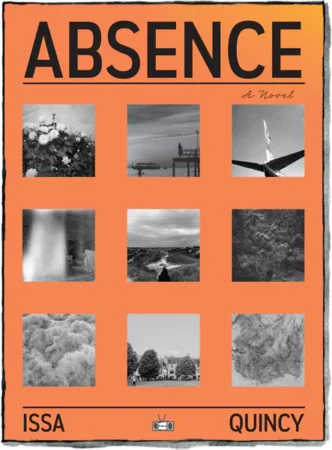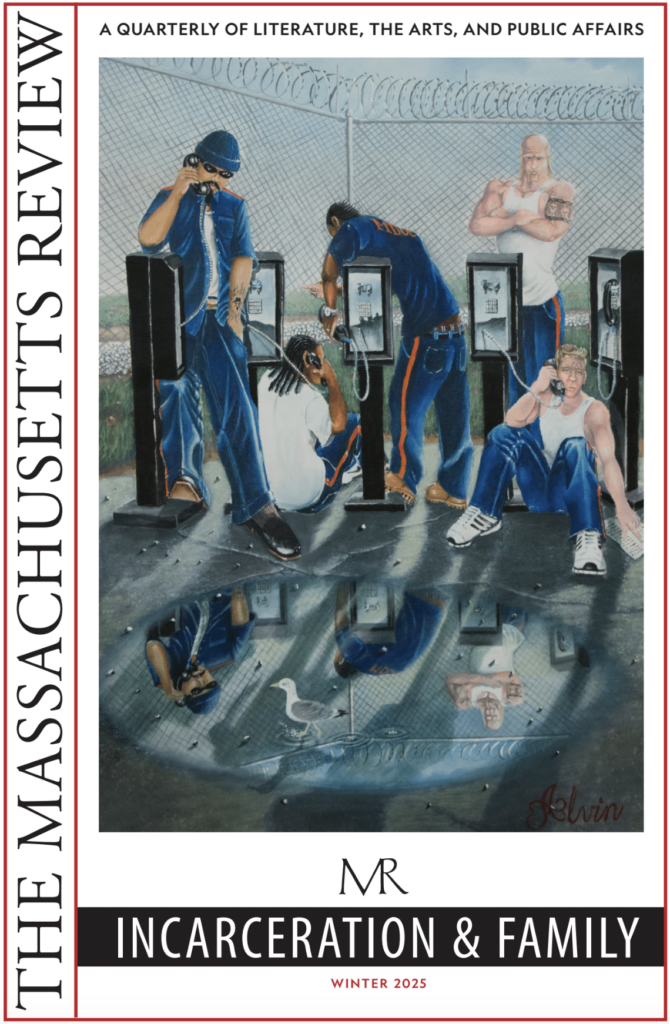A Review of Issa Quincy’s Absence

In Issa Quincy’s debut novel, Absence, the unnamed narrator mythologizes a series of figures
that he directly or indirectly encounters, including a disgraced teacher and the student he seduced and forever changed; a lonely bus driver in Boston; a disabled landlord who mourns the lesbian aunt his family abandoned; and other strangely compelling people.
Each of these episodes stages the revelation of a life. The subject of or a witness to this life offers
it up in language—tells the story—to the narrator, who takes up the pose and position of
attentive listener. Almost all of the episodes are bookended by the death of one or more of their
subjects, so that they can be read as chronicles that guard against the subjects’ oblivion, that is,
their being forgotten. The entire novel is structured by the death of the narrator’s parents, who
are similarly mythologized and recur throughout as storytellers in their own right, or as points of
connection to the other protagonists—through, for example, a poem that the narrator’s mother
often recited to him when a child and which he later, repeatedly, finds traces of in others’
personal effects; or a photograph of his adolescent self taken at his godfather’s funeral that his
father carried with him around the world.
The prose is consistently and incredibly beautiful. The truest iteration of the text would be in the
form of a live reading to a rapt audience. Verses and images that travel in and reappear through
time and space are instructive signs for how the novel approaches language. The lines are so
rhythmic and resonant (“the tremor of a true and deep-rooted spirit”; “to suffuse that slowly
appearing gap”) that they echo in the reader’s mind, and later return, unbidden. Each word is
precise and carefully chosen so that the text rewards rereading: first for the story, then for its
craft.
Early in the novel, the narrator describes the painting Winter Landscape with Ice Skaters by
Hendrick Avercamp, and says that it is “the close detailing of the variance of life,” with “death,
pleasure, ecstasy, frivolity, poverty, and secrecy … all perceived from a heightened position.” He
posits that, “what is presented is the sight of the intangible spectator that sees what is in front of
him, recognizes everything, and curtails judgment of anything.” It appears, then, that the novel is
an attempt to achieve with words what Avercamp achieves with brush and color. Here is a “close
detailing of the variance of life” from the perspective of a narrator who “curtails his judgment of
anything.”
Though the narrator is not completely effaced, he is certainly an “intangible spectator,” or rather,
an intangible listener. We have only a vague sense of his age, occupation, and motivations. He
listens to the stories that others have told him and reiterates them to the reader. When he offers
his perspective or emotional reaction, it is usually one of stupefaction, a being dazed by the story
told, unable to respond because the intensity of the story itself forecloses the possibility of an
adequate or meaningful response. He also need not respond because the storyteller does not
require his feedback. Rather, they are simply grateful for his listening ear. Sharing, of himself, only his dazed reaction, the narrator has the room relay at length everything that he is told,
including all manner of diversions, because everything matters, and all of it is encompassed in
“the variance of life.”
Each word is precise and carefully chosen so that the text rewards rereading: first for the story, then for its craft.
In a long episode on the narrator’s godfather, Max, the novel most clearly articulates its method
of showing singular hearts and the wider, infinite world through the threading together of
different, connected stories. Prompted by the photograph from Max’s funeral that his father
loved, the narrator, who never knew Max, goes in search of his life story. He meets Margaret,
Max’s family friend, and she tells him about Max’s childhood, his art, and his continuously
interrupted becoming. She tells of her friendship with his mother, Sarah, the trajectory of Sarah’s
own life, that of his father, Adam, and of his brother, Patrick. Sarah’s parents and Adam’s
parents, too, are evoked. The racist attack against Max’s employer, a Black magazine editor, is
also integral to the story. As is Max’s journey to Thailand, and the experiences he recorded in a
journal of his time in its forests. One gets the sense reading this episode that each character who
figures is a portal to a new, different story. And in each portal that one opens and enters, one
finds suffering. Not constantly, but eventually. Eventually, there is sickness, eventually there is
betrayal, eventually madness, eventually poverty, eventually loneliness. But the universality of
this suffering, and its role as connective tissue between people and the fabric of their storytelling,
confers beauty onto it. The story of Max and his family is a story of people who were basically
doomed by the horrific histories of their ancestors to live lives of unfulfillment. But even in these
thwarted lives, they were witnessed, remembered, and loved—by Margaret, by the narrator’s
father, by the narrator himself.
Notwithstanding the moral ambivalence of some of its characters, Absence is a deeply ethical
novel. It is, before anything else, the expression of an ethic: a commitment to “the unseen and the
unheard,” to people whose stories are usually and otherwise untold. This much is made explicit
in the second chapter, through the narrator’s witnessing of a bus driver whose chief complaint is
her invisibility, and who, because of this novel, is no longer unheeded. The unnamed, unseen,
and rarely heard narrator seems to be taking on the erstwhile absence of these abandoned people
so that they might become present. The narrator (and Quincy) seem to be wagering that this
narratorial absence will allow their subjects to come into focus and be seen clearly, fully. And
they are largely correct.
Because of this close attention to diverse figures, Absence spans decades and continents with
ease. It captures moments in history from the Algerian War of Independence to the degradation
of working-class life in postwar England, and it does all this in 160 pages. It is a small book, and
in this way it is of the twenty-first century, but its spirit is older, belonging to the long novels of
the nineteenth century, with their far-reaching, world-encompassing ambitions. By telling these
particular stories through these particular figures, the novel reveals that every story is a frame
story, all narrative is recursive, and mise en abyme is as legitimate a method as social realism in
revealing the wideness of the world. In this way, the novel departs from Avercamp’s model and
finds a model, instead, perhaps, in Borges’s aleph, the point through which all things can be
seen, not because of a high vantage, but because it is refractive, kaleidoscopic.
There is one question concerning the novel’s range, that remains, however, and it returns us one
final time to Avercamp. Does Absence as it praises the winter landscape for doing, show “death, pleasure, ecstasy, frivolity, poverty, and secrecy”? To be sure, there is death, there is poverty,
there is secrecy, but I did not encounter much pleasure or ecstasy or frivolity. Most of the
episodes are portraits of lives not very well lived, and where one finds some sense of frolic
alongside tragedy, the telling is primarily tragic, and does not live much in other modes. But
perhaps the novel seeks only to represent what is tragic, and I am overtaxing its brief allusion to
the winter landscape. Its other important allusion is to a verse that begins with the lines, “He is at
peace — this wretched man — / At peace, or will be soon” (from a poem by Oscar Wilde,
unattributed in the text), and this verse, with its emphasis on wretchedness in life and peace in
death, might better serve as evidence of the novel’s goals. Still, even if this were the case, it
would probably be a more moving text, its tragedy more deeply felt, if it were counterbalanced
by moments of relief.
Likewise, the novel might have acknowledged its artifice once or twice. Many of the stories the
narrator hears and reports are arriving at him a few degrees separated from firsthand experience,
but they are written with a level of detail that would imply that each person involved in the
retelling is gifted with immense powers of both recall and oration, a situation which is unlikely.
The narrator, then, is clearly embellishing, erring, empathizing, imagining (and what beautiful
empathy it is, what impressive imagining), but there is no winking mention of this artifice, no
levity around it. The narrator is obviously omniscient, but the novel disavows his status as author
and creator, and identifies him only as a faithful listener and recorder. This feels like a missed
opportunity. To acknowledge the narrator’s creative act, to present him both as a faithful listener
and a reporter using his poetic license, would have established between the reader and narrator
the same complicité we find between the narrator and his interlocutors.
Still, there are advantages to this disappearing act. The narrator’s absence—the absence,
therefore of his intention, his creation, his remembering, his exaggerating, his
poeticizing—makes it possible for the novel to achieve the incredible feat of feeling true and
based on the author’s real-life encounters and at the same time, further-reaching than lived
experience and capacious in the way that the best fiction is. Its characters have a life and
resonance beyond the intrigue of their possible real-life counterparts. Absence is representative
of fiction at its most human and its most comprehensive. It is full of imaginative empathy and
marked by its breadth, its multivocality, and its truth. It is a novel that views storytelling as
sacred, as the key to revealing connections between people that are not always or easily apparent.
It is an intelligent, beautifully written text that betrays its author’s intimate relationship with
language. And it is a wonderful debut which proves that Issa Quincy has closely observed the
world and promises that he will continue to find new and care-filled ways of presenting it.
KANYIN AJAYI is a stage director, writer, and scholar with a PhD in Comparative Literature. She recently translated and directed Marie NDiaye’s play Rien d’humain and has published short fiction in Angel Food.



